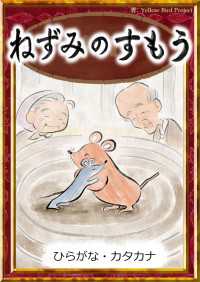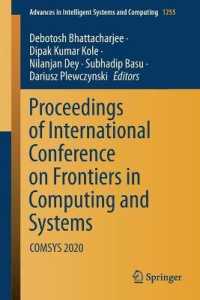- ホーム
- > 洋書
- > 英文書
- > History / World
Full Description
The sub-title is important: The History of a Small Town and an Extinguished World. The small town is Bransk, in eastern Poland. Before World War II, Bransk was a shtetl whose population was equally divided between Poles and Jews. Today there are no Jews.
In Shtetl, Eva Hoffman reconstructs the lost world of East European Jewry She explores the rich culture and institutions of Polish Jews, and looks at the forms of multicultural coexistence during several centuries, the shades of prejudice and tolerance and the phases of conflict and comity. By probing the deep ambivalence that coloured relations between Poles and Jews on the eve of World War II, Shtetl throws new light on motives which influenced Christian villagers' decisions to rescue or betray their Jewish neighbours when the Nazis invaded.
'Charting the ebbs and flows of repression and tolerance, uprisings and occupation, migration and assimilation of Poland's history, Shtetl provides a rare and valuable analysis of the troubled relationship between Poles and Jews over the centuries. For the Jews, Poland is the symbol of murder where the Nazis set up their killing fields and where the Polish post-war response was further brutality, followed by amnesia: for the Poles, there remains a feeling of unfairness that their own wartime sufferings are overlooked. Hoffman's interest lies in rescuing the past from the evasions, concealments and half-truths demanded by post-war politics and national pride - as well as from the additions of the imagination, which all memory to some extent invokes.' Caroline Moorehead, Daily Telegraph
'A luminous and deeply engrossing social history' Lisa Appignanesi, Independent
'This is a subtle, fair, scrupuously even-handed piece of work. It begs moral questions of us all ... Hoffman gives no answers, but she asks the questions, and observes the moral hazards with a rare sensitivity.' Julia Neuberger, Irish Times
-

- 電子書籍
- おぼろとまち 1 ジャンプコミックスD…
-

- 電子書籍
- ねずみのすもう 【ひらがな・カタカナ】…
-

- 電子書籍
- 転生魔女は滅びを告げる【分冊版】 26…
-

- 電子書籍
- 「運と不運」には理由があります - 銀…




